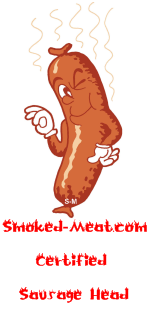Dave - good question!
Speaking of slices from whole meat - properly handled as you decribe - my take is that 140-145 will take care of it. Any "nasties" would be on the dry, salty, cured surface. In the case of ground meat, the "surfaces" are everywhere, inside and outside (due to the grinding and mixing).
I'm going to go out on a limb and say that ground-meat jerky that a) might have pathogens somewhere on the inside and b) might be improperly handled or prepared (not enough salt and/or cure - or not dried enough) might have a potential to maybe have pathogens. Cooking the jerky would eliminate this ever-decreasing danger and act as a failsafe against even the stupidest jerky-maker who is utterly incapable of following the simplest steps, assuming he has a plan for shoving a probe into an eighth of an inch of dry, hard meat.
I think we all need to keep in mind that jerky is and always has been a FOOD PRESERVATION TECHNIQUE, whether in the kitchen or 200 years ago on the plains in an Indian camp - or in a laboratory. The fact that we are here to talk about it is proof that it worked just fine, hundreds of years before mankind ever heard the dreaded words E coli. Do it with a modicum of common sense, and it really is "Darwin-tested-and-approved," and nothing to dwell over.
Speaking of slices from whole meat - properly handled as you decribe - my take is that 140-145 will take care of it. Any "nasties" would be on the dry, salty, cured surface. In the case of ground meat, the "surfaces" are everywhere, inside and outside (due to the grinding and mixing).
I'm going to go out on a limb and say that ground-meat jerky that a) might have pathogens somewhere on the inside and b) might be improperly handled or prepared (not enough salt and/or cure - or not dried enough) might have a potential to maybe have pathogens. Cooking the jerky would eliminate this ever-decreasing danger and act as a failsafe against even the stupidest jerky-maker who is utterly incapable of following the simplest steps, assuming he has a plan for shoving a probe into an eighth of an inch of dry, hard meat.
I think we all need to keep in mind that jerky is and always has been a FOOD PRESERVATION TECHNIQUE, whether in the kitchen or 200 years ago on the plains in an Indian camp - or in a laboratory. The fact that we are here to talk about it is proof that it worked just fine, hundreds of years before mankind ever heard the dreaded words E coli. Do it with a modicum of common sense, and it really is "Darwin-tested-and-approved," and nothing to dwell over.


 Mr. Beam will take care of anything else
Mr. Beam will take care of anything else 


Comment